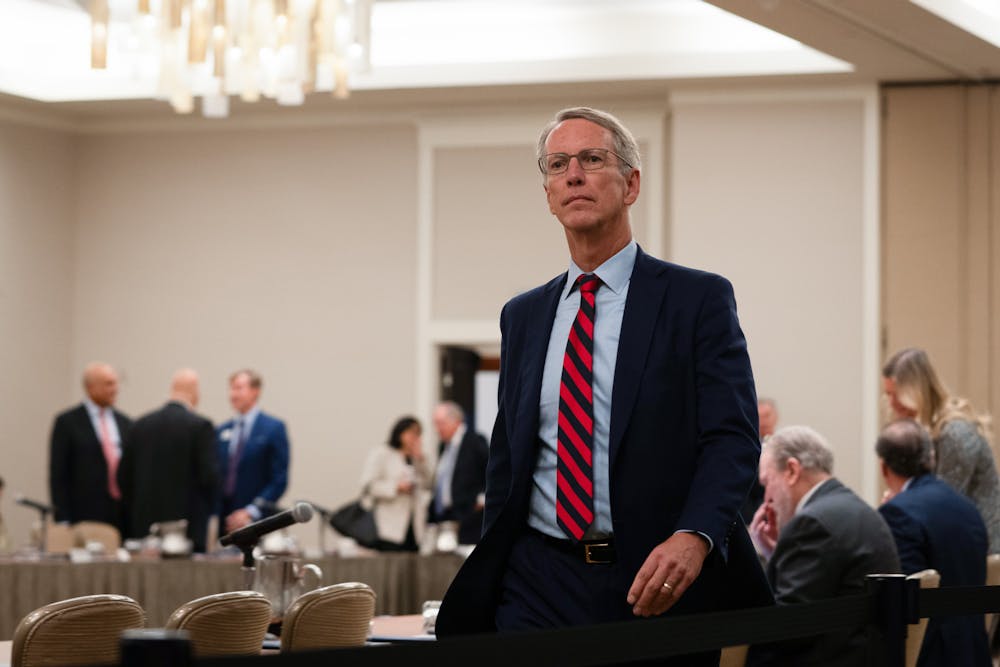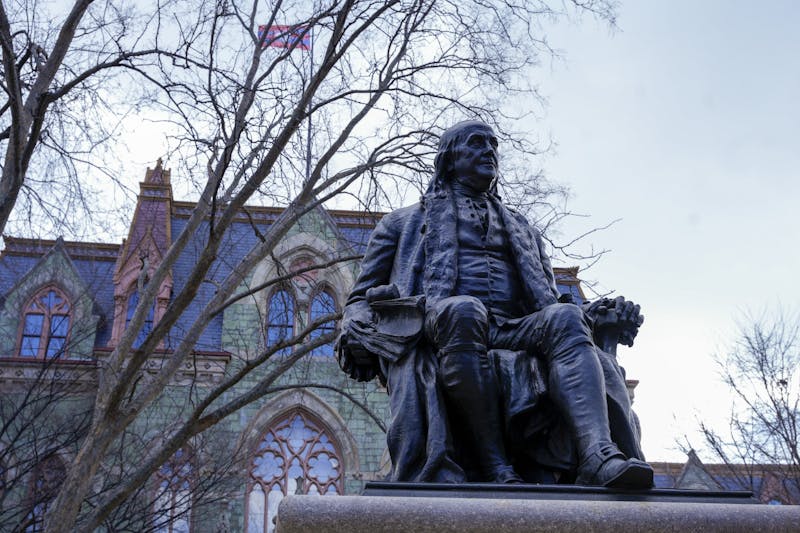
Sixteen months after his highly publicized resignation as chair of the University Board of Trustees, Scott Bok sat down for a wide-ranging interview with The Daily Pennsylvanian ahead of the release of his new book.
Bok’s book — titled “Surviving Wall Street: A Tale of Triumph, Tragedy, and Timing” and set to be published on May 6 — spans the course of his life, including his undergraduate experience at Penn, his career on Wall Street, and his tumultuous tenure as board chair. In a 90-minute interview with the DP, Bok reflected on the events that led to his departure, discussed the forthcoming release of his book, and offered a candid assessment of the federal government’s campaign against higher education — which he said “started at Penn.”
Bok — who has not publicly spoken on these topics aside from a Dec. 12, 2023 op-ed in The Philadelphia Inquirer after resigning — said he didn’t think the situation at Penn could “be easily folded” into “sound bites or even short articles, or even a quote here or there.”
The final two chapters of Bok’s book provide a detailed account of what unfolded behind the scenes in the weeks and months leading up to his and former Penn President Liz Magill’s resignations on Dec. 9, 2023. Bok likened the donor retaliation, calls for Magill’s resignation, and heightened political scrutiny at Penn to another “boardroom situation,” similar to the “tough decisions and real crises” he faced throughout his career on Wall Street.
Bok explained that the events leading to Magill’s resignation felt like a “corporate takeover.” More specifically, he described it as an “activist shareholder situation” where stakeholders — many of whom were from Wall Street themselves — used “various tools and tactics to get control of the board.”
In the book, Bok describes serving on a board as usually either “boring or scary.” Throughout his career — which included serving as chair of the Board of Trustees of the American Museum of Natural History — he explained that “almost every board ends up having a moment that’s scary.”
However, Bok noted that nonprofit and university boards are not well equipped to handle crisis situations like the one that unfolded after the Palestine Writes Literature Festival in September 2023 and subsequent campus discourse surrounding the Oct. 7, 2023 Hamas attack on Israel.
The controversy over the Palestine Writes Literature Festival was the first major flashpoint in a semester of turmoil at Penn. Though the festival was not officially sponsored by the University, its use of Penn venues and inclusion of speakers accused of antisemitism provoked outrage from some Jewish groups, alumni, and national organizations.
Donor and trustee backlash escalated after the Oct. 7, 2023 attacks, with several major donors pulling their support from the University and calling for Magill’s resignation over what they perceived as Penn’s insufficient response to antisemitism.
Bok said that it would have been “unprecedented” for Magill to cancel Palestine Writes or to exclude specific speakers. In the book, Bok recalled his private conversations with donors and trustees about the festival, including individuals who publicly denounced the event.
“One of the ironies that I make very clear in the book is that … some people who were the most staunch advocates for free speech … were the ones who suddenly flipped and wanted to constrain speech,” Bok told the DP.
The final chapters of the book also describe groups of Trustees holding discussions behind Bok’s back to push Magill out after her congressional appearance — even though Bok and Magill had already independently decided that she would resign.
What people did not know, according to Bok, was that the “decision was already made, [but] I was not going to tell anybody.”
As external pressure from political figures and elected officials increased on Penn, Bok said the situation within the Board of Trustees “develop[ed] like a fever.”
He said that while Magill was “highly respected” by the Board of Trustees, the situation was “chaotic” and that Penn’s Trustees were looking for anything to take the pressure off Penn and “calm things down” — which made some people “desperate to get President Magill to resign.”
The DP previously reported that the Board of Trustees was largely supportive of Magill during a meeting two days after her testimony, and that both parties decided to resign independently of the Board of Trustees.
Bok also discussed the role that social media played in last year’s controversy, which he said fed into “one of the most preposterous misconceptions that came out of this whole saga.”
Having received three degrees from Penn, Bok said that he was personally familiar with the preprofessional culture of the school — and noted that “no one should confuse 2020s Penn with 1960s Berkeley.”
“People want to spin a tale — which I think a number of people across America are inclined to believe — that [Penn] students are mostly radicals,” Bok said. “It just could not be further from the truth.”
Bok added that he believes donors “should have, frankly, very little influence over how universities are run.”
“In the business world, the mantra is that litigation is almost never worth it. You’re almost always better off trying to find a way to settle,” Bok said. “I understand that mentality, because I’ve seen it forever in the business world, and I tend to agree with it in that context. But I think some things are more important than that.”
Sixteen months later, Bok said that he doesn’t “harbor any ill will, anger or frustration, unhappiness about any aspect of what happened.” The one exception is that he believes “what happened was not fair to Liz Magill.”
“For [Magill] to be the one that bore the burden, bore the blame for this, I just think it’s unfair, and there’s nothing that can be done to undo that,” Bok said. “But I do think the University and the Board [of Trustees] owes her a better send-off.”
Even if belatedly, Bok called on Penn’s leadership to pass a resolution of gratitude that the Board of Trustees “passes every time a president is done with her tenure.”
In his limited public statements after resigning, Bok said that in the fall and winter of 2023, Penn’s “campus [had] never been more closely watched.” He described what happened as a “battle for the soul of the University, maybe, of all of the universities.”
Looking at “where the world is right now,” Bok said, he realized “you know what, I was absolutely right about that.”
“I think anyone on either side of the debate would agree with that,” Bok said. “They would just have a different view as to what the outcome should be.”
Since 1968 Wharton graduate and President Donald Trump returned to the Oval Office in January, higher education institutions have faced a firestorm of executive orders, federal funding cuts, and governmental scrutiny.
Bok described the current situation universities across the country are confronting as a “crisis” that is “fair to say started at Penn.”
A key point Bok made in his book — and emphasized in the interview — is that criticisms of Penn regarding concerns of campus antisemitism were, in some instances, a “backlash against DEI and so-called ‘woke.’”
“I don’t think that was clear to a lot of other people, but it was clear to me early on, as you can see described in the book, and it’s become more and more clear as time has gone on,” Bok continued.
Bok explained further that while antisemitism is real, “evil,” and “should be addressed and condemned,” his concern is that the “agenda was so much bigger, and now you see that playing out.”
On Feb. 6, the Department of Education launched an investigation into Penn alleging Title IX violations for allowing 2022 College graduate and transgender woman Lia Thomas to represent Penn women’s swimming and diving during the 2021-22 NCAA swimming and diving season.
In March, Trump’s administration announced that it would be freezing over $175 million in federal funding to Penn, citing the University’s failure to bar transgender athletes from women’s sports. According to a White House tweet, the decision was a result of Penn’s “policies forcing women to compete with men in sports.”
“I actually think the charge made against Penn and withholding the research funding makes even more clear that what is being done is really more about politics and control and culture in a backlash against woke,” Bok said about the recent federal actions against Penn.
Bok said he hopes that Penn President Larry Jameson — and the University as a whole — will “strongly resist any inappropriate attacks on Penn.”
He added that one of the reasons he wrote the book is because he “want[s] to be engaged and involved in this debate,” describing himself as a “cheerful warrior on behalf of academic freedom and free expression.” With a “more conservative administration in charge,” Bok asserted that “speech has probably never been so constrained” in his lifetime.
“I think Penn is an institution that embodies some core historic values that aren’t always adhered to in the best way, but those core historic values are still here,” Bok concluded. “That’s the Penn I love, and that’s the Penn I will continue to advocate for.”
The Daily Pennsylvanian is an independent, student-run newspaper. Please consider making a donation to support the coverage that shapes the University. Your generosity ensures a future of strong journalism at Penn.
Donate










